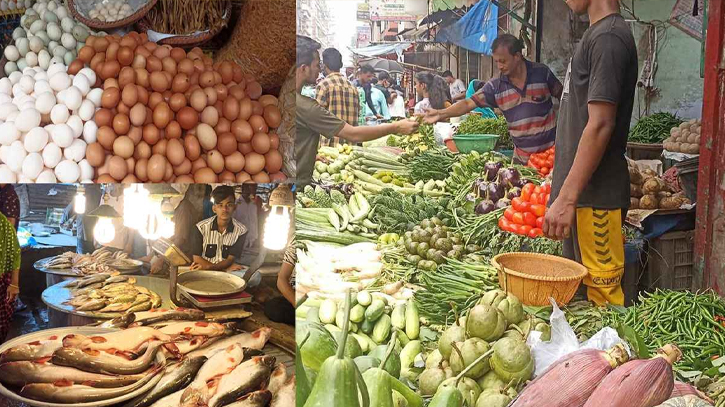
Photo : Collected
Despite the government's implementation of price caps on potatoes, onions, and eggs more than a month and a half ago, there is still no noticeable decrease in their prices. In fact, in some cases, prices are continuing to rise rather than showing any signs of abating.
A visit to several kitchen markets in the capital on Friday morning revealed that shops continue to sell these items at significantly inflated prices.
In the kitchen market, locally produced onions are being sold at a high of Tk 110 per kilogram, Tk 10 more than last week.
On the other hand, Indian onions, despite being regulated by the government at Tk 64-65 per kg, are being sold at higher rates, ranging from Tk 85-90.
Similarly, the price of potatoes has risen to Tk 60 per kg, Tk 10 more than last week, despite the government's fixed rate of Tk 35-36 per kg.
Although egg prices slightly decreased, they have risen again to around Tk 13 now.
Additionally, the price of broiler chickens has increased by Tk 10 per kg and is now being sold at Tk 200-210 per kg.
The market analysis of the Trading Corporation of Bangladesh (TCB) indicates that after price regulations, the price of onions had decreased to Tk 75-80, eggs to Tk 12-12.50, and potatoes to Tk 45.
“The government made attempts to boost the supply and conducted market monitoring. However, these efforts to increase the supply were unsuccessful, rendering the monitoring ineffective. If ensuring an adequate supply had been prioritized before monitoring, it would have been more beneficial,” Golam Rahman, president of the Consumer Association of Bangladesh (CAB), told the Daily Messenger.
He emphasised, “Implementing measures like price regulations proves futile without a secure supply. This strategy hasn't been successful here either; instead of declining, prices have persistently risen.”
Egg and onion imports
During discussions with traders and market monitors, it has come to light that the government has been actively involved in the import of onions. However, it's worth noting that the imported onions are currently being retailed at Tk 80, which represents a notable escalation from the prior price range of Tk 55-65 just a month ago.
Despite the permission to import 15 crore eggs, not a single imported egg has reached the country even after a month.
Commerce Minister Tipu Munshi said that the imported eggs would reach the country within three to four days during a TCB event on 15 October.
At that moment, seven importers confirmed they obtained Letters of Credit (LC) for egg imports. However, nearly 10 days have elapsed, and no eggs have arrived.
“Exporters from other countries need to provide certificates confirming the absence of Avian Influenza or Bird Flu virus and harmful bacteria. It has been reported that import complexities have arisen due to the certificate requirements,” said the commerce minister.
Due to this complexity, the import process has become uncertain.
Vegetable prices
These price increases coincide with a period when various vegetables and fish have already experienced significant surges in the market. Currently, vegetables are scarcely available for less than Tk 80-100, and eggplant prices have risen substantially, surpassing Tk 120 in the market.
Additionally, despite concerns raised by the Cold Storage Association regarding reduced potato production, the government has not acknowledged this issue.
“Even though the government has provided information indicating a potato production of over 1 crore tonne this year, potato production has not exceeded 80-85 lakh tonne in reality,” said Mostafa Azad Choudhury, president of the Cold Storage Association.
According to the Tariff Commission, the annual demand for potatoes is nearly 90 lakh metric tonnes, which is higher than the current supply.
CAB President Golam Rahman said, “The government has taken some measures, but their implementation has shown shortcomings in their effectiveness.”
Meanwhile, Haji Mohammad Mazed, a trader and importer of onions in Shyambazar, said, “Rising prices and the dollar crisis have made imports extremely challenging. There is also a slight decrease in supply within the country. That's why controlling onion prices has become difficult.”
“If the supply increases, prices will naturally rise,” he added.
Messenger/Sajib








